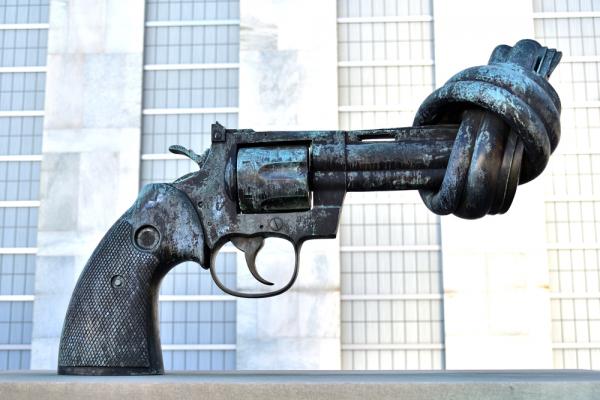Mass shootings happen when toxic masculinity reaches its most extreme form.
The United States has a trend of writing off mass shootings as random incidents perpetrated by a few outliers who suffer from mental illness or a traumatizing family background. And, while it is necessary to have conversations about mental health and trauma in our culture, neither present as high of a statistical risk factor for violence as gender. To make sense of violence, specifically domestic and gun violence, we need not only look for the what to blame but to who and why.
With men accounting for all but two of mass shootings in recent history and specifically white men making up over 50 percent of the shooters, we are faced not with a simply a psychological problem, but a social one. What is it that causes this culture of violence?
It is much easier to treat violence as a series of one offs rather than to hold all men responsible for the culture of masculinity that both nurtures and normalizes domestic and mass violence. We have a cultural epidemic that has not randomly emerged, but has been developed over time through embedding patriarchy and misogyny into the foundation of U.S. culture.
By using violence to drive Indigenous people off their land, men bred entitlement through force. By using the system of chattel slavery as an economic means to abuse and sexually assault enslaved women to multiply their property, men created a cultural incentive to abuse women. By elevating bastardized patriarchal Christian values of submission and the inferiority of women, men in the U.S. spiritualized and normalized entitlement to power and control over others bodies. Legacies of violence and oppression are just that, legacies. This violence not only formed the foundation of how the U.S. created patriarchy, but how it upholds it.
Because the violence of the past was so bad, supposed lesser forms of violence seem less worthy of deconstruction. Toxic masculinity and gun violence are fruits of the same legacy. While it is much easier now to say that slavery and genocide were evils, we have failed to cut them off at their roots, the roots that reek of manipulated biblical texts, hyper masculine domination, and antiquated assumptions about gender. We cannot expect that simply acknowledging the events that resulted from toxic masculinity in the past will deconstruct the assumptions and values that created it to begin with.
Toxic masculinity is primarily violence and entitlement, with most acts of violence seeming to surface when men have been told “no” in some way. Men are taught through media, church, business, military, and more, that to be a man is to use stereotypical iterations of masculinity to achieve success. Everyone loses in this framework. Men are taught that they are to be strong and put together, never the victim (specifically of trauma), and exist without showing or feeling emotions. Sadness, sentimentality, and silliness are perceived as weak rather than natural parts of the human experiences.
Toxic masculinity robs society. It robs women of their safety but it robs men of their full humanity. To be human is to feel, to express creativity in all of our identities, to experience vulnerability and loss and to respond to it all. Toxic masculinity teaches men to machines, unmoved by their feelings and experiences, this doesn’t mean those things don’t exist or dictate how men experience the world, it simply encourages problematic expressions of repression, typically violence and domination. The men who carry out shootings are not stronger, better, or manly men, but rather the product of a culture that breeds violence and entitlement.
It is not uncommon for men to reject the notion of toxic masculinity and play it off as an individual issue that doesn’t apply to all people. Some go as far to say that to fight the culture of violence is to emasculate men or wage a “war on men” — like the Gillette commercial that came out a few weeks ago.
Many would prefer to adopt a “not all men” ideology instead, distancing themselves from the responsibility to identify with this culture that they benefit from. It will take men collectively rejecting entitlement, learning non-violent ways to manage stress, and to protect us as a culture, not just from mass shootings and domestic violence as we saw last week and have seen for decades and centuries, but from the everyday violence — physical, psychological, and ideological — in between the extremes that threatens to strip as all of our safety and humanity.
Got something to say about what you're reading? We value your feedback!




